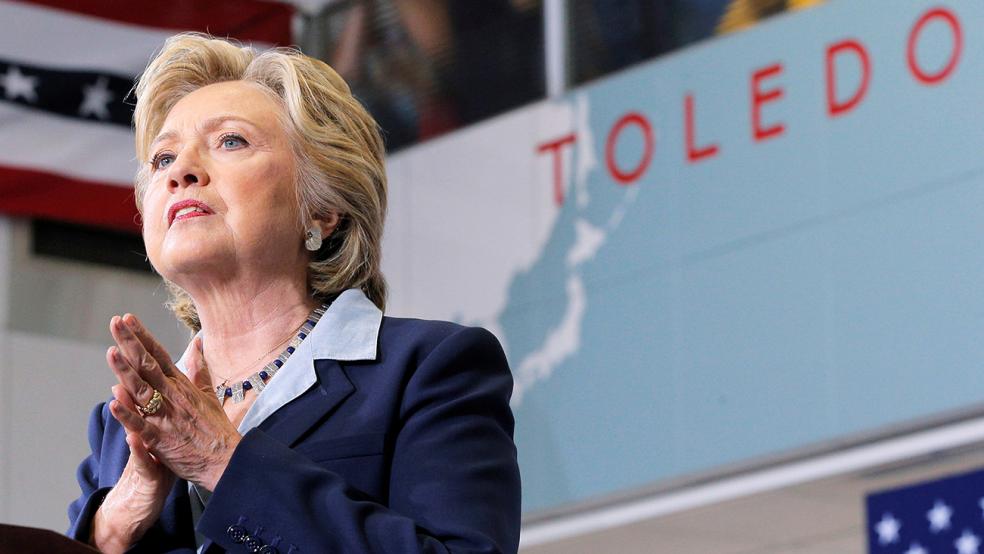When Barack Obama took charge of the White House in 2009, one of the first things he did was issue executive orders that made good on his campaign pledge to curb the influence of Washington lobbyists on his administration.
Although the number of registered lobbyists has dropped from 15,000 in 2007 to about 9,700 in 2016, according to the Center for Responsive Politics, President Obama’s efforts to padlock the revolving door between K Street and government were largely unsuccessful.
In an exhaustive investigative report in December 2015, Politico concluded with example after example, that at best, Obama’s efforts were an incremental step toward cleaner government.
Now there are signs that the fat times may be back for lobbyists if Hillary Clinton is elected.
Related: FBI Documents Refer to ‘Quid Pro Quo’ With State Department Over Clinton Emails
On Monday, The Washington Post reported a surge in lobbyists bundling donations to the Clinton campaign -- $11 million between July and September vs. $2.7 million in the second quarter of 2016 and $1.8 million in the first, according to new Federal Election Commission filings.
As a candidate in 2008, Obama had introduced rules that limited donations from lobbyists and political action committees to the presidential campaigns of Democratic candidates. Early this year, the Democratic National Committee rescinded those restrictions.
No lobbyist bundling was reported by the Trump campaign during the same period, the Post said. (Bundlers are individuals who raise more than $17,600 – the threshold set by the FEC – from relatives, friends and co-workers.)
Also on Monday, USA Today reported that about a dozen big corporations that made donations to the Clinton Foundation and may have sought to influence the State Department while Clinton was Secretary of State used lobbyists who have raised millions of dollars for her presidential campaign.
USA Today identified at least four of the lobbyists as “Hillblazers” – those who have raised at least $100,000 for the campaign.
Among the corporations using the lobbyists who became major Clinton fundraisers were Microsoft, Pfizer and Exxon, USA Today said, citing data from the Center for Responsive Politics and federal lobbying records.
An August 2015 op-ed co-authored by Clinton and Wisconsin Senator Tammy Baldwin, said, “Inviting outside voices into government is often a good thing. When public servants have experience beyond Washington, they bring new ideas, new perspectives, and new knowledge to the work of governing this huge, complicated country of ours … Most of the time, that private-sector experience is an asset, not a liability. But in some cases, it can affect the public trust — for example, if a public servant’s past and future are tied to the financial industry. That’s when people start worrying that the foxes are guarding the hen house.”
Related: Here's What Could Happen to Stocks if Clinton Wins
The op-ed said Clinton was supporting a bill introduced by Baldwin, and also supported by Wall Street gadfly Senator Elizabeth Warren of Massachusetts, that would place more restrictions on moving from the financial services industry to government and vice versa -- an effort to close loopholes that contribute to potential conflicts of interest. Among other things, the bill would prohibit private employers from offering bonuses to job candidates when they leave government service and would require government employees to recuse themselves from any decision involving former employers for two years – up from one.
However, as The Boston Globe noted yesterday, Clinton, who has pulled down $60 million in donations from Wall Street and $28 million from lawyers and lobbyists, has been unclear about her plans to clamp down on corporate influence and conflicts of interest.
The Globe quoted a Clinton campaign aide as saying that no lobbyists are working on its policy committees and no lobbyists are on her transition team – something that Politico Playbook also reported.
However, the chair of the Clinton campaign is John Podesta, who with his brother Tony founded the powerful Washington lobbying firm The Podesta Group in 1987. John Podesta, who served as White House Chief of Staff for Bill Clinton was co-chair of the Obama transition team. Although he is no longer is a principal in the firm, Podesta’s hacked emails have become an issue in the campaign and OpenSecrets.org has charted his revolving-door history.
As both Politico and the far-Right website Breitbart have pointed out, the Clinton transition team is headed by former Senator and Interior Secretary Ken Salazar, a partner in the powerful Washington law firm of WilmerHale, which has been deeply involved in lobbying efforts in support of the Trans-Pacific Partnership and on behalf of the Business Roundtable and others.
Related: Here’s Why Goldman Paid Clinton a Bundle for That Speech
The bio for Salazar on the WilmerHale website says Salazar “provides legal, strategic and policy advice to national and international clients, particularly on matters at the intersection of law, business and public policy.”
WilmerHale clients counts big banks such as Citigroup, JPMorgan Chase and investment bank Goldman Sachs.
Among the batch of hacked Podesta emails on the WikiLeaks site is one that calls into question Obama’s commitment to closing the revolving door as far back at October 2008. An email from Michael Froman to Obama entitled “Diversity” offers lists of candidates for “senior level jobs in a potential administration.” Froman, a classmate of Obama’s at Harvard Law School, had been chief of staff to Bill Clinton’s Treasury Secretary Robert Rubin before following him to Citigroup, where Froman became CEO of CitiInsurance and head of Emerging Markets Strategy. Froman joined the White House staff in 2009 and was appointed U.S. Trade Representative in 2013 by President Obama.
Elizabeth Warren was one of the four senators who opposed his appointment.





